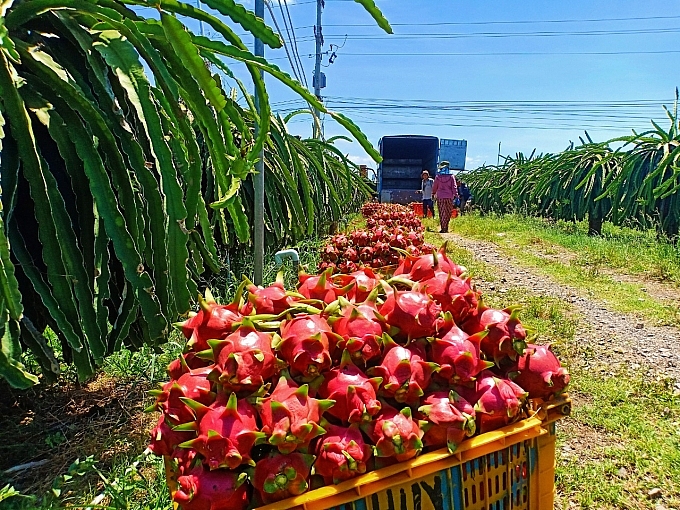Agricultures, Foods, News & Event
What is the solution for exporting Vietnamese agricultural products?
Although many types of Vietnamese agricultural products are currently exported to many major countries in the world such as China, Japan, the United States, the EU, Australia, etc., in reality, Vietnam still exports agricultural products. Mainly raw materials, low processed content, accounting for about 70-80% of total export turnover, so the value and level of competitiveness are not high…
Building a supply chain for Vietnamese agricultural exports
From the beginning of the year until now, exports continue to be a bright spot in the economic picture as they maintain a very impressive growth momentum. According to data from the General Statistics Office, export turnover in May 2024 reached 32.81 billion USD, up 15.8% over the same period last year.
In particular, the fruit and vegetable industry is one of the products with impressive export turnover compared to last year. The turnover in May was estimated at 700 million USD, up 7.4% over the same period last year. In the first 5 months of 2024, the preliminary trade balance of goods is estimated at a trade surplus of 8.01 billion USD.

Although many types of Vietnamese agricultural products are currently exported to many major countries in the world such as China, Japan, the United States, the EU, Australia, etc., in reality, Vietnam still exports raw agricultural products. Mainly, the processing content is low, accounting for about 70-80% of total export turnover, so the value and level of competitiveness are not high. It can be seen that this is not a sustainable and effective direction.
According to experts, the export market space is huge for Vietnamese enterprises, but in addition to ensuring stable quality and quantity for partners, Vietnamese agricultural export enterprises also need to diversify. products and increase added value for seasonal fruits by constantly improving product quality, adapting to regulations on quality standards, quarantine testing requirements, packaging, and products. certification, traceability according to the requirements of the importing country,…
Mr. Vu Ba Phu, Director of the Department of Trade Promotion (Ministry of Industry and Trade) assessed that currently, most local businesses are medium, small and very small in scale. Therefore, despite having export potential, these units cannot meet large-value foreign orders as well as large output. Local People’s Committees need to have incentive mechanisms to form and develop specialized foreign trade enterprises.
The EU, United States, Australia,… are very strict markets. Even though goods have been brought into this market, in the long run, if they do not meet the standards set by their partners, it will be difficult to enter another market. Again.
“We must have synchronization. Exporting agricultural products is a supply chain. If this chain can be guaranteed, all stages of the supply chain will operate very smoothly.” – Mr. Tran Tuan Minh – Director of Vietnam – ASEAN Trade and Investment Promotion Center shared.
Product quality and competitive prices are important factors that help Vietnamese agricultural products win the trust of consumers in many demanding markets such as Europe, America, Japan and many other countries.
Diversify markets and diversify export products
Looking from the success of Bac Giang province’s lychee export promotion, over the past time, the province has always consistently directed from province to grassroots, to produce agricultural products with outstanding quality and unique characteristics. Yes, promote the application of techniques and technology, ensure traceability, meet market requirements,…

At the same time, the province also promotes production and deep processing of lychee products such as dried lychees, lychee juice, frozen lychees and canned lychees,… to diversify export products and attract participation. participation of entities participating in the value chain from manufacturers to distribution systems, processing and exporting enterprises, and business support organizations, contributing to bringing the province’s lychees further and sustainably. than.
In addition, the province also proactively connects and invites businesses to sign consumption links, and about 10 businesses have plans and signed contracts to consume exported lychee with lychee growers and are well prepared. Conditions for participating in promotion and trade connection programs and conferences, Participate in displaying, introducing and promoting products at fairs and exhibitions inside and outside the province.
By these methods, Bac Giang lychee has become a famous brand, having a foothold for many years in the markets of countries such as China, Japan, Australia, the United States,…
Recently, Can Tho exported the first batch of green-skinned mangoes to the Australian and United States markets. According to Mr. Le Chi Phuong – Vice Chairman of Co Do District People’s Committee, City. Can Tho, the first batch of green-skinned mangoes being exported is the starting point to create motivation for mango farmers to actively learn scientific and technical knowledge and new regulations of domestic and foreign markets.
Since then, gradually improving product quality and design to better meet market requirements, contributing to increasing the value of Co Do mangoes, while helping to increase income and stabilize people’s lives.
In the coming time, Co Do district hopes to access policies and support programs for farmers in the stage of linking consumption, new regulations, techniques, and good programs from central agencies and cities. Can Tho City helps Co Do farmers grow and export more Co Do agricultural products to many international markets.
In order for Vietnamese-branded agricultural products to affirm their value on shelves in the international distribution system, export businesses and producers are required to constantly improve product quality, meeting customer needs. Meet regulations on quality standards; Comply with requirements for quarantine testing, packaging, goods, and traceability according to the requirements of the importing country.
In addition, Vietnamese businesses also need to regularly update market information and current policies to improve quality and diversify products, diversify product industries and shift from developing agricultural supply chains to Developing the industry value chain, keeping pace with the consumption trends of the global market.
Source: https://tapchicongthuong.vn/giai-phap-nao-cho-xuat-khau-nong-san-viet-nam-122719.htm

